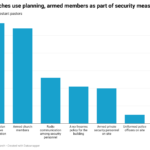
How do pastors continue to minister effectively while shouldering the weight of caregiving responsibilities?
By Peter W. Rosenberger
Lifeway Research’s Greatest Needs of Pastors study revealed that 23% of pastors grapple with caregiving responsibilities for aging parents. Despite this noteworthy statistic, it likely underestimates the prevalence of caregiving responsibilities affecting today’s ministers. While caring for aging parents garners significant attention due to the inevitability of decline, it represents just one facet of the caregiving landscape for ministers. Caregiving challenges extend to those caring for children with special needs, supporting loved ones battling addiction, and providing care for family members grappling with mental health issues. The list of potential caregiving responsibilities is extensive and varied.
How do pastors continue to minister effectively while shouldering the weight of caregiving responsibilities for those aging parents?
During my mother’s arduous battle with heart disease, I witnessed the struggle my minister father faced in keeping pace with her needs even as he was in the early stages of Parkinson’s disease.
“Dad, I’ve been a caregiver for decades, and I can barely keep up,” I remarked with a wry smile. Then, like he had done for me countless times before, I placed my hand on his shoulder and encouraged him: “Dad, you didn’t attend medical school, but you’ve been to divinity school; do something divine!”
With a nod of understanding, he did what he had done throughout his life. He turned to his Bible and sought solace in Scripture. This is how pastors navigate the daunting and often prolonged journey through the valley of the shadow of death. By seeking refuge in their faith, they find strength to persevere, knowing God accompanies them through the darkness.
“Scripture beckons us to emulate the sacrificial service of Christ, who selflessly ministered to others without regard for Himself.” — @Hope4Caregiver Click To TweetTransformative caregiving
The objective, however, isn’t merely to alleviate the challenges of caregiving or find solace in them but to grow and be transformed through them. The intimate exposure to the brokenness and suffering inherent in human existence can provoke internal conflict and spiritual struggle. Yet it is precisely in these moments of darkness and challenge that faith is tested and convictions are solidified. Scripture beckons us to emulate the sacrificial service of Christ, who selflessly ministered to others without regard for Himself.
Most pastors would agree their theology is reflected in sermons, Sunday School lessons, small groups, hospital or home visits, and funeral services. But our theology also manifests with every toilet we clean, adult diaper we change, meal we serve (by hand as we help them eat), and each time we seek forgiveness for losing our cool. We display our faith and doctrine when we humble ourselves to serve.
Limitations and leaning on others
Some caregiving circumstances may require pastors to humbly seek assistance from members of their congregation. While it may be difficult to accept help with household chores, home repairs, or grocery shopping, pastors must recognize their limitations and be willing to lean on the support of their community. A pastor who is miserable, broken, and spent isn’t much good to a family or a church.
Pastors facing long-term caregiving responsibilities may need to engage in frank discussions with church leadership about the need for additional support and resources. This could involve arranging professional caregiving services, counseling, or establishing contingency plans for unexpected caregiving emergencies.
“A pastor who is miserable, broken, and spent isn’t much good to a family or a church.” — @Hope4Caregiver Click To TweetChurch leaders should help guard a pastor’s space and time, allowing them to process their pain privately before eventually sharing publicly. It is unwise for a pastor to divulge details to every church member. Paint with a broad brush rather than share explicit stories. The best policy I’ve seen is to select a group of deacons or elders who serve as confidants. It’s exhausting (and a bit irritating) as a caregiver to regularly provide updates to well-meaning but peripheral relationships. Vulnerability is required, but gracious boundaries are encouraged.
Internal changes
Yet before any of these or other caregiving tasks can proceed smoothly, internal changes must occur within the pastor—as for every caregiver. God uses many things in our lives to bring opportunities for sanctification to the forefront. And caregiving is a common (and effective) one. Caring for a chronically impaired loved one serves to illuminate character defects and theological weaknesses. In short, prolonged caregiving provides a front-row seat to the human condition.
Hospital rooms have a way of forcing honest conversations about how we feel about ourselves, one another, and God. Caring for a declining loved one forces internal conversations that rarely come any other way.
The prosperity doctrine promulgated by all too many in evangelical circles comes up painfully short when faced with the reality of suffering, aging, and death. The human condition often serves as a wake-up call for bad doctrine.
Yet, in those confrontations of reality, some of the greatest biblical truths grab our hearts in profound ways. Our hymnals are filled with compact theology written by those who walked through severe heartache yet lived to sing and preach about the strength they discovered in those painful journeys.
Sermons waiting to be preached will be inspired while heavy hearts change adult diapers. Pastoral care will be enhanced by sitting at the bedside. Counseling will pierce deeper from those who wearily hang their head in the laundry room. And those who mourn will be comforted by those who have hospice workers in their homes. We minster out of our wounds, for that is where we meet the Healer.
“We minster out of our wounds, for that is where we meet the Healer.” — @Hope4Caregiver Click To TweetEncouragement for the weak
To weary fellow ministers who give care while serving a congregation, there are many tips one can incorporate to manage the challenges. Still, it starts with a willingness to meet God in the affliction rather than demand to be on the other side.
There are few higher qualities a pastor could put on his resume than that of a family caregiver. While those qualities come at great cost, such a pastor knows how to serve and rely upon God in ways that will benefit every church member. For pastors struggling under great burdens as they step to the pulpit—particularly those weary caregiving ministers—rest in the timeless truth that your ministry remains defined by the One who issued the call. Let your best sermons be the ones preached to your own heavy heart.
“But he said to me, ‘My grace is sufficient for you, for my power is perfected in weakness.’ Therefore, I will most gladly boast all the more about my weaknesses, so that Christ’s power may reside in me. So I take pleasure in weaknesses, insults, hardships, persecutions, and in difficulties, for the sake of Christ. For when I am weak, then I am strong.”
2 Corinthians 12:9-10 (CSB)













